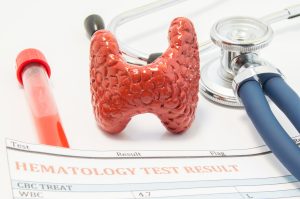This fact might amaze you, but thyroid and depression are very closely interlinked.The close relationship between hypothyroidism and depression has also been noticed in the manner in which their supplements respond and connect in the human body. It has been found that thyroid hormone supplements accelerate and increase the clinical response to drugs for anti-depression on patients suffering from these two diseases.
Understanding What are Thyroid disorders and How are these Linked with Depression
The hormone-secreting glands located at the front of your throat, resembling a butterfly, is what is medically termed as the thyroid gland. These are responsible for regulating the energy levels in your body, monitoring your metabolism rate and even executing other vital functions of the human body.When this gland does not produce an adequate amount of hormone thyroxine, it is known as hypothyroidism. There is considerable overlap in symptoms of hypothyroidism and depression. In hypothyroidism one experiences:
- Excessive sleep
- Weight gain
- Weakness
- Impaired concentration
Due to the above, one may feel that he/she is undergoing depression, whereas actually, the person is having a condition called ‘hypothyroidism’.On the other hand, Hyperthyroidism
is a condition with an overactive thyroid gland in which excess hormone is produced. This may be confused with anxiety and mood swings as
there are various common symptoms between the two. These are an increased heart rate, insomnia, high blood pressure, irritability, mood swings and anxiety.

Are Thyroid and Depression More Common in Women Than Men?
Yes, women are more prone to develop thyroid conditions than men. Women are also more likely to suffer from depression than men. Owning to biology, women are more susceptible to hormone-induced depression.Several major hormonal changes that take place in a woman’s life can cause depression and low mood:
- Premenstrual syndrome
- Pregnancy
- Postpartum depression- depression after the delivery of the baby
- Menopause- depression around cessation of menses
Reasons for the Occurrence of Hypothyroidism
Hyperthyroidism or hypothyroidism may be caused due to several reasons. The thyroid hormone production level gets disrupted when there is inflammation in the thyroiditis, the thyroid gland. The thyroid is also a painless, hereditary immune system disease. This condition is termed Hashimoto’s thyroiditis.Apart from these, a temporary thyroid condition is also seen in about 10% of women who have given birth and hence it is termed postpartum thyroiditis. It should, however, be kept in mind that thyroid, caused due to whatever reasons can lead to depression at any stage.Read More:
Effects of HypothyroidismInteraction between Thyroid and Depression Medication
Medicines given in hypothyroidism can affect the way your depression medicines work. If you are on depression medicines like amitriptyline, imipramine then informs your doctor as hypothyroid medicines can increase their effectiveness and increase the risk of side effects related to the heart.
To Conclude
It is quite confusing at times to determine whether a person has depression or a thyroid imbalance because both have similar symptoms. Also, just having tested normal for TSH does not imply you do not have a thyroid imbalance. You need to check on your T3 and T4 levels as well, to determine whether you have a thyroid problem or not.Consult your general practitioner as well as a mental health professional for your thyroid and depression issues, so that they can be treated properly and simultaneously.Read More:
Difference Between Hypothyroidism and HyperthyroidismDisclaimer: The information provided here is for educational/awareness purposes only and is not intended to be a substitute for medical treatment by a healthcare professional and should not be relied upon to diagnose or treat any medical condition. The reader should consult a registered medical practitioner to determine the appropriateness of the information and before consuming any medication. PharmEasy does not provide any guarantee or warranty (express or implied) regarding the accuracy, adequacy, completeness, legality, reliability or usefulness of the information; and disclaims any liability arising thereof.Links and product recommendations in the information provided here are advertisements of third-party products available on the website. PharmEasy does not make any representation on the accuracy or suitability of such products/services. Advertisements do not influence the editorial decisions or content. The information in this blog is subject to change without notice. The authors and administrators reserve the right to modify, add, or remove content without notification. It is your responsibility to review this disclaimer regularly for any changes.



























Comments